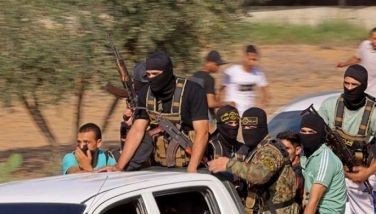News Analysis: IS subway threat raises concerns of attack on US
WASHINGTON (Xinhua) - An alleged Islamic State (IS) plot to attack US subways has raised concern about the reach of the terror group, and begs the question of whether militants have the capability to hit the United States
Iraqi Prime Minister Haider al-Abadi told reporters on the sidelines of this week's United Nations meetings that the IS planned to hit subways in New York and Paris, although US authorities said there's no evidence to back up the claims.
Still, with an estimated 100 US citizens who have trained or fought with IS, the concern is that a US-passport holder could enter the country unnoticed and plant a bomb.
IS grabbed headlines worldwide after its recent conquest of vast swaths of territory in Syria and northern Iraq, a move that sparked a US bombing campaign to deny the terrorists a safe haven by which they could plot terror attacks against the United States, just as al-Qaeda did in Afghanistan in the lead-up to the 9/11 attacks.
But the extent of the IS threat to the US homeland remains unclear. Certainly the group would like to attack the United States if it had the chance, experts say. But the group has its hands full in Iraq and Syria, and it's unclear just when and if an opportunity to hit the United States will present itself.
If IS were to strike the United States, the operation would be on the scale of the Sept. 11, 2001 attacks on New York and Washington that killed nearly 3,000 victims from countries worldwide, RAND Corporation associate political scientist Colin P. Clarke told Xinhua.
Indeed, the group won't be satisfied with something perceived as impotent or unspectacular, Clarke added.
While some experts say IS is currently preoccupied with establishing a radical Muslim state based on its twisted interpretation of Islam, the group said in recent months that it would "raise the flag of Allah in the White House."
Despite US air bombardments against IS targets in Syria and Iraq, experts say boots on the ground are needed to defeat the radicals.
While air bombardments certainly can help US efforts, such operations are best suited to knocking out relatively visible targets such as armored vehicles and fixed facilities associated with logistics, training and command and control.
Air strikes can produce some enemy casualties, but if IS fighters don't have to mass to fight against ground troops, they are likely to disperse and hide among civilian populations, some experts say.
While five Arab allies - Saudi Arabia, Jordan, Qatar, United Arab Emirates and Bahrain - have joined a US-led coalition to fight the IS, it remains unknown whether those states will lend ground forces. And while France and Britain have assisted in the bombing campaign in Iraq, they have lent no troops.
With an eye on his legacy as the president who ended the US war in Iraq, Barack Obama is unlikely to deploy US ground forces, many experts say.
- Latest
- Trending
































